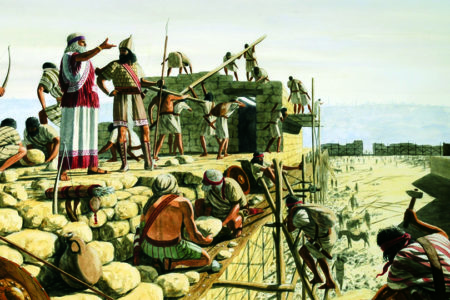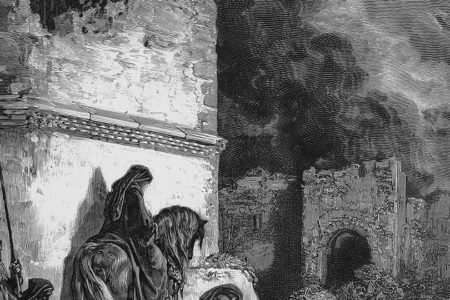Nehemiah: Facing the Opposition
Whenever the Lord calls a person to serve Him, opposition usually follows. Sometimes it comes in a very subtle manner, and at other times it comes through strong, open resistance. Unbelievers and believers alike can be the source of such problems, and people never know in advance how, when, or from where opposition to the Lord’s work will appear.
The Book of Nehemiah contains several classic examples of opposition encountered by a man called by the Lord to accomplish a specific task. Nehemiah committed his problems to the Lord, faced the issues, and emerged victorious. We can learn from him as we apply the principles he used to our own lives.
Nehemiah’s Call from the Lord
Nehemiah had risen to a very important position in the court of King Artaxerxes of Persia. One of his responsibilities was to protect the king from assassination attempts. As the king’s cupbearer, he tasted all the food and drink brought before his majesty to determine if it was poisoned or tainted in some way.
While serving in the Persian capital of Shushan, Nehemiah received word that the city of Jerusalem was in a desperate situation. Because he was a man of prayer, Nehemiah went before the Lord with this disheartening news. He realized during the time spent on his knees that God had chosen him to return to Jerusalem, encourage the remnant that had returned, rebuild the walls of the city, and thus remove their disgrace.
Nehemiah then made a bold move. He presented his case to the king, who allowed him to go to Jerusalem to accomplish the task the Lord had given him. In fact, King Artaxerxes encouraged Nehemiah by giving him letters providing safety in travel and enabling him to obtain the necessary materials to rebuild the walls.
OPPOSITION TO REBUILDING THE WALLS
Opposition from Without
No sooner had word of Nehemiah’s mission spread than the first indication of trouble came. “When Sanballat, the Horonite, and Tobiah, the servant, the Ammonite, heard of it, it grieved them exceedingly that there had come a man to seek the welfare of the children of Israel” (2:10).
Sanballat and Tobiah were persistent in their hatred for the Jewish people and for Nehemiah in particular. Sanballat was the governor of Samaria, and Tobiah had many family ties with the Jews of Jerusalem and probably was the governor of the Ammonite lands. They were ready to take on this foolish Jewish wall builder who had recently returned from the court of Artaxerxes.
First they opposed Nehemiah and his workmen through ridicule: “They laughed us to scorn, and despised us, and said, What is this thing that ye do? Will ye rebel against the king?” (2:19b). Nehemiah’s response to the taunts of Sanballat, Tobiah, and Geshem was that the matter was in the Lord’s hands. They would go on building the walls, as commissioned by Him, and no one would stop them from their God-given task. Neither would these opponents be given a place to live in Jerusalem because it was not theirs to have (2:20). Nehemiah’s God-given responsibility could not be deterred by the ridicule of the crowd.
Next the enemies opposed God’s people through mockery. Chapter 4 relates that the reconstruction of the city walls was well under way, and the gates were also being repaired, when Sanballat learned that the work was continuing and became angry. He could not allow the project to go on. Seeking to bring the rebuilding to a halt, he resorted to mockery. He said to his brethren and the army of Samaria, “What are these feeble Jews doing? Will they fortify themselves? Will they sacrifice? Will they finish in a day? Will they revive the stones out of the heaps of the rubbish, seeing they are burned?” (4:2).
Sanballat attempted to make the Jewish people look and feel foolish by convincing them that they could not accomplish their task. He claimed that it would be impossible to build on top of the pile of rubbish that was on the ground. The rocks underneath, having been burned, would split and cause a weakened wall to fall. Tobiah, standing next to Sanballat, added to the insult by declaring that any wall the Jews built would be so weak that if a fox, weighing just a few pounds, walked on it, the structure would collapse (4:3).
Their mockery didn’t deserve a response from God’s faithful servant. He ignored it and poured out his heart to the Lord to bless the Jews and bring spiritual judgment on his enemies. He realized that God would handle the matter far better than he.
Finally Sanballat and his cohorts opposed the building project through conspiracy. As the walls neared completion, they were angered all the more and planned a sneak attack on the laborers as they worked. Nehemiah used several methods to meet the impending attack. First, he asked the people to pray and then set a watch day and night. Second, he positioned the people in places around the wall near their homes and families so that they were prepared to fight for their own wives, children, and homes.
When the enemies heard that the Jews were aware of the conspiracy and the planned attack, they stopped their harassment-temporarily. Nehemiah then took additional steps to resolve any future problems. He ordered half the men to be prepared to fight with their weapons while the other half built the wall. Eventually even those laying the stones on the wall had a trowel in one hand and a sword in the other. They labored long, from dawn until the stars came out. They were determined to get the work done quickly.
Opposition From Within
Attacks came on a regular basis from the Gentiles around Judah. This was expected. However, it was more difficult to deal with problems within the camp, and such opposition must have been discouraging to Nehemiah.
First the Jews told him they were tired: “And Judah said, The strength of the bearers of burdens is decayed, and there is much rubbish, so that we are not able to build the wall” (4:10). Apparently they didn’t really want to accomplish the task the Lord had assigned to Nehemiah and themselves. In essence, they had taken their eyes off the Lord and were thinking about themselves. God had ordained the building of the wall for protection from their enemies, but when the Jews internalized the situation, they wanted their own way rather than God’s prescribed plan.
Next they were plagued by fear. Apparently the enemies of God’s people had attacked them psychologically. They were convinced that their ranks had been infiltrated and it was only a matter of time before they would be slain. They complained to Nehemiah ten times about their fear. Needless to say, Nehemiah was faced with a difficult problem, but he again reminded the people that the Lord was with them and that they were to be prepared to fight. When their enemies learned that the Jewish people knew of their plans, they realized that God had brought their counsel to nought.
Chapter 5 describes three more problems Nehemiah confronted. First, the builders wanted to leave their labor on the walls and go back to farming. They claimed they would soon run out of food, and their families would face starvation.
Second, because they could not farm their lands, the builders complained that in order to purchase food they had to mortgage their properties, vineyards, and houses. This, however, was a poor excuse because the entire project was completed in only 52 days (6:15). Perhaps they could have freed themselves from their chores for less than two months without suffering financial ruin.
Then there was the problem of taxes. “We have borrowed money for the king’s tax, and that upon our lands and vineyards” (5:4). They pointed out that their children would be taken in servitude and bondage, which they did not want, nor did Nehemiah.
This area of opposition apparently touched Nehemiah’s heartstrings, for he became very angry, not at the people in general but at those who were taking advantage of his workers. He quickly responded with a strong rebuke, commanding those who were charging interest to stop the practice immediately. “Ought ye not to walk in the fear of our God because of the reproach of the nations, our enemies?” (5:9). Nehemiah pointed out to the usurers that they were bringing reproach on the name of God.
There is an old adage, “If at first you don’t succeed, try, try again.” Nehemiah’s enemies certainly did this. Their next step was to try to dispose of God’s servant through foul play. They asked Nehemiah to leave his work and meet them at a village in the plain of Ono. Their purpose was to kill him. Realizing their malicious intent, Nehemiah told them he was too busy working for the Lord to meet with them. In spite of his reply, they tried on four more occasions to trick him into leaving the work, but to no avail.
This fearless leader responded brilliantly to the opposition against him. God had called him to accomplish a task, and, with the Lord’s help, the job was completed. Would to God that every Christian had the same resolve and fortitude.
Opposition to Nehemiah’s Leadership
Nehemiah suffered opposition through accusation. Sanballat was not one to give up easily. Chapter 6 relates that he sent a letter alleging that the frenzied activity of building the wall was merely a guise for what was really happening: Nehemiah was planning a rebellion designed to set himself up as king of the Jews. He accused God’s wall builder of persuading the prophets to say, “There is a king in Judah” (6:7). This was an attempt to make Nehemiah respond in fear. Instead, he quelled the false rumors and asked the Lord to strengthen his hands so that the task would soon be completed.
Opposition also came through deceit. Shemaiah tried to deceive Nehemiah into locking himself in the Temple for his own protection, but Nehemiah quickly saw through this deceitful plot. To have followed this suggestion would have desecrated the Temple and brought God’s wrath on His servant. Nehemiah knew that Shemaiah was not sent by God.
Conclusion
As opposition came, Nehemiah faced it squarely. He cried out to the Lord for help and then made sound decisions. He did not allow himself to be intimidated by the opposition or the people who caused it. The end result was victory. The people of Jerusalem had their protective walls, and the city was safe again.
We, as believers, can learn valuable lessons from this faithful servant of the Lord. As we accept God’s direction and leading and step out by faith to accomplish His tasks, we will face all kinds of opposition. Some of it will come from enemies of the gospel, and some will come from friends. To overcome the hurdles, we must depend on the Lord and face them with His help. Then we can stand victorious at the completion of the task. The Lord will carry us through.








God bless the message as educative as it is. Really uplifting spiritually.
Nehemiah is a man of faith and good to follow